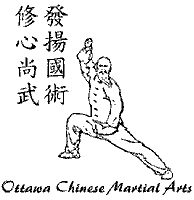
| Home | |||
| About Us | |||
| History | |||
| Philosophy | |||
| Practice | |||
| Reference | |||
| Shaolin | |||
| Hsing Yi | |||
| Tai Chi | |||
| Bagua | |||
| Baji | |||
| Health | |||
| Other Styles | |||
|
|
|||
| Links | |||
| Directory | |||
| News | |||
ung fu, "wushu", and "kou shu" are just some of the many names used to describe the cultural heritage bequeathed by the Chinese Martial Arts.
Kung fu, a term from the Cantonese dialect of Southern China, can be literally translated as "work". This expression is used colloquially to designate the martial arts, and is the most commonly understood term in the West. In the East, Wu Gong ("Martial work") might be more appropriate.
Wushu is the term selected by the People's Republic of China because it is translated as "Martial Arts". Wushu is now commonly applied to the sport of martial arts.
The term "Kuo shu" was introduced at the dawn of the New Republic and can be literally translated as "country's art". This term is also used in Taiwan, where the connotation is also closer to the idea of martial arts as a sport.
This web site uses the colloquial term "kung fu" because of its familiarity. In the West, most people first encountered the term "kung fu" through martial arts movies. Indeed, in this cinematic context, kung fu was presented as some mysterious or magical means for fighting. Others see kung fu more as a series of health-promoting exercises or in relation to spiritual development. More recently, some people have begun to consider the martial arts as a physical sport. Chinese martial arts are all of the above and more.
The secret is to keep an open mind and to give yourself time to discover what they mean to you. In this sense, "kung fu" simply means "effort through time ". Our school, the Ottawa Chinese Martial Arts Association, provides discourse in both the philosophy and the applications of the martial arts. Our school motto is
"To advance in the skills of Wushu - dedicate yourself to the practice of martial arts"
This means the practitioner is encourage to understanding the marital spirit not just during training but in everyday life. (That is why we go for lunch ..)
Copyright 2003
